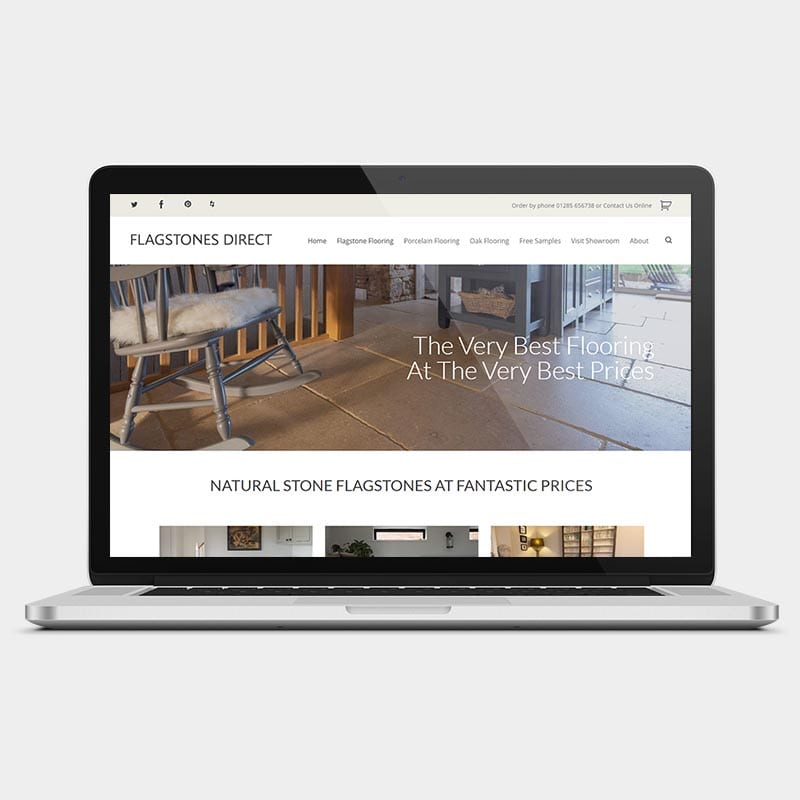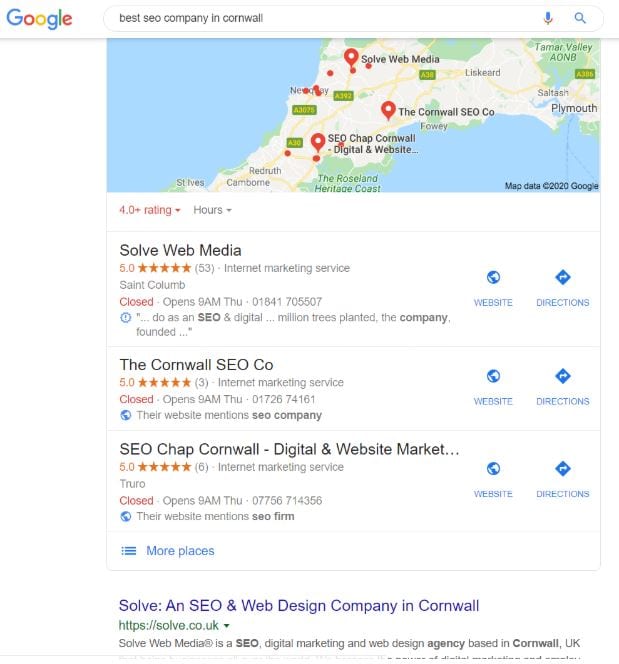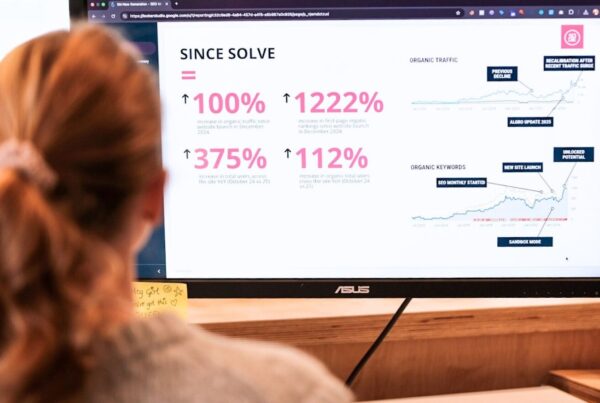
First, Happy New Year for all of us at team Solve, and welcome to 2020!
We love this time of year. The time when you look back over the previous year, think about what you’ve learnt and decide what you hope to achieve in the coming 12 months. It’s a time filled with positive vibes, hope, excitement, optimism and ambition.
So what did we learn in the SEO world in 2019? And how will that shape SEO strategy in 2020?
Here are the top SEO takeaways from 2019 and how you can use them to give your business a boost in 2020.
1. Your web design must focus on user experience
Throughout 2019, web design has become increasingly focussed on user experience. It’s not enough to have a site that looks great anymore, and you have to be careful not to overcomplicate your web design, regardless of how cool it looks.
In 2020, your website needs to be intuitively designed with easy, logical navigation and engaging, multimedia content that’s current, compelling and concise. You need to get inside the mind of your target user and take them on a journey through your site, hooking them in on the homepage, selling your benefits and brand story, and giving them lots of opportunities to engage and stay in touch. Some sites now even have chat pop-ups, so people can talk with you in real-time as they navigate your site – check out Keavy bottom right!
If your website provides a good user experience, people will spend longer on your site, navigate from page to page, share your content, and ultimately, build a positive impression of your brand, making them more likely to convert.
And user experience and SEO go hand-in-hand. Google likes sites that provide a positive user experience too. All of their recent algorithm updates and changes to search focus on providing users with the best possible search experience, so they look for websites that do that too and rank them accordingly.

2. Your content should be tailored to user intent
Similarly, this year has also seen more emphasis on writing content for users first, then search engines. As part of that strategy, content creators have been honing in on user intent to provide the content that people want to see and that promotes conversion. This year, we’ve seen user intent classified into 4 main types:
Informational intent – When people are looking for information about a given topic e.g. the weather or SEO.
Navigational intent – When people are trying to locate a specific company, brand or website e.g. people who search for “Solve Web Media” know where they want to go.
Transactional intent – When users are ready to make a purchase, but they are using a search engine to locate the best deal e.g. “Nike Air Force 1 size 7”.
Commercial/investigating intent – When people intend on buying in the near future but use the web to do their research first e.g.“what washing machine would be best?”.These people also have transactional intent but they need more convincing before they’re ready to buy.
As a content creator, you need to decide what your target user’s intent is and sculpt your content to meet this intent.
And with the BERT update of this year, Google is also using natural language processing to focus more accurately on user intent too, ensuring they supply the right results based on the intent behind users’ queries.
3. Site speed is crucial
Site speed became increasingly important throughout 2019 as it heavily influences a user’s experience of your site. Google recommends that your site loads in 3 seconds or less, and 40% of people will actually abandon a site that takes longer than this. If your site loads quickly, it provides users with what they want faster, they spend longer on your site, bounce off less and promote your site to other users – all of which will positively impact your ranking.
Load speed on mobile grew as a ranking factor in 2019 too, following on from Google’s Speed update of July 2018. In 2019, Google saw load speeds improve in 95% of countries, and in the slowest third of traffic, user-centric performance metrics improved by 15% to 20%.
So the internet is getting faster to please users and search engines alike. Could your site speed be improved? Take the speed test here, and if your site takes more than 3 seconds to load, you’ve got some work to do. Optimisation, improved site design and efficient hosting, can all improve your load time. Check out our article on load speed for more info.
4. Mobile-friendly sites are essential
2019 taught us that having a mobile-friendly or mobile-responsive site is essential.
Around 78% of people own a smartphone, and 72% of people choose their smartphones to access the internet over any other device. So having a mobile-friendly website is more important than ever. By mobile-friendly we mean a site that appears correctly, neatly and tidily on any mobile device.
Google strongly recommends you have a mobile-friendly site and they started rolling out mobile-first indexing in 2019. Mobile-first indexing means that Google will rank mobile-friendly sites first. Desktop sites will still rank, but they will be penalised. In fact, as of 1st July 2019, mobile-first indexing is enabled by default for all new websites.
This preferential indexing for mobile sites, together with load time as a ranking factor mean that in 2020 having a fast-loading, mobile-friendly site will be critical. Check out how mobile-friendly your site is here.


5. Focus on building EAT
In 2019, we’ve seen businesses using clever content, backlinks and online networking to build their online EAT profile, which is known to boost your search engine rankings.
E-A-T stands for Expert, Authority and Trustworthiness. SEO strategies like popular social media profiles, informative blog posting, authoritative backlinks and positive customer reviews, all help build your brand as an expert and authority in your field. This, in turn, makes users and search engines trust you more, boosting your popularity, ranking and brand equity. Something you’ll reap the benefits of for years to come.
6. Site security is paramount
Online sales now represent around 20% of all retail sales. That’s almost 3 times what it was 10 years ago. And as more people are buying online, this popular marketplace has become a target for crime. There have been many high profile hacking scandals in recent years, with even social media giants Facebook falling victim to hacker tactics. So although they love to shop online, consumers are becoming increasingly concerned and savvy about security when using the internet.
Having a valid SSL certificate for your site is critical in 2020. Internet users can see if your site is secure from the URL and if the browser displays the little padlock beside it. Some browsers won’t even display your site if you don’t have an HTTPs URL, or they will at least warn users about entering a non-secure site. That’s definitely not the best first impression and certainly won’t help users trust your brand.
It doesn’t impress search engines like Google either, who ranks sites without the telltale ‘s’ in the URL lower. Find out more about SSL in our HTTPs for SEO article.
An open-sourced web design platform like WordPress will allow you to keep your site design up-to-speed and ahead of hacker tactics. And a secure web host will also help keep your site, brand and clients’ details safe.
7. Use video content
According to recent studies, we now watch around 1 billion hours of video daily, on YouTube alone. Whether it’s your favourite cat video, the latest movie trailer, a how-to or a virtual tour of an aspirational holiday destination, video content provides us with much more than music nowadays.
And YouTube is now the second most popular search engine after Google too.
So from a business perspective, video content is a huge marketing opportunity.
With effective video content, you can bring your product to life, tell your brand story, grow a following and connect with your audience. It provides engaging, enriching content and gives you an extra avenue to capture traffic and convert.
Having engaging videos on your website can attract people’s attention and lower the bounce rate of your site. Video content will also keep visitors on your site for longer. Both of these factors are known to help with SEO.
So if haven’t started already, 2020 is the year to look at using video content to market your business.

8. Google My Business can get you seen locally
Google has made a lot of updates to local search this year in a bid to supply users with the most relevant results possible. And Google My Business (GMB), is a great tool for boosting your local SEO.
Local results appear with a map before any organic search listings, and all of this data comes from GMB. If you want to get seen at a local level, you need to make sure you have a GMB profile, it’s up to date and you stand out against the competition.
To sell your business via GMB, your profile needs to include positive reviews, a good star rating, compelling images of your business (particularly if you’re in hospitality), and you can even share your blog posts there, exerting your EAT status and giving you extra opportunities for engagement.
2020 is the year to ensure you’re using your Google My Business (GMB) profile to the best of your advantage.
9. Online reviews are powerful
Reviews are hugely powerful and an important part of your online marketing strategy for 2020. A 2019 study showed that 86% of consumers now consult online reviews when looking for local businesses. For many people, getting the opinion of others is a critical step in the buying process. Having the best possible reviews helps customers trust your company and reassure them that they’re making the best possible decision.
And the more positive reviews you have, the more Google will trust you too, which is a ranking factor as discussed. Online reviews show Google that people are interested in your company, and they actively encourage you to respond to reviews to show you value your customers. Moz estimates that this online review activity makes up over 6% of the criteria that influence local search rankings. So having lots of positive online reviews and responding to them can boost SEO. And for the odd time you get a negative review, follow our dos and don’ts to learn from your experience and protect your brand.
10. The internet is constantly evolving
Google admits to making around 9 changes to search every day.
If you look back at our SEO news updates from 2019, you’ll see that every month the geeks at Google are making everything from minor tweaks to major core algorithm updates. And they don’t even announce the smaller changes, they only inform us about the ones they think will have a significant impact.
The search-scape is constantly evolving and it will continue to evolve throughout 2020, so it’s important you keep up to speed. And we don’t just mean subscribing to an SEO blog like this one. To keep up with competitors, buying behaviours and market developments, as well as algorithm changes, your SEO strategy needs to be on-going, adaptable and responsive. SEO specialists like Solve can help keep your SEO activities on top of whatever this coming year brings.
Go forth and prosper!
So that’s the biggest SEO lessons of 2019, and the overall message is clear. 2019 has taught us that SEO isn’t really about optimising for search engines anymore. SEO in 2020 is about optimising your website and online content for users first, and search engines will naturally follow.
What could you improve on in 2020?
We’ve been designing websites for over 20 years and have achieved some great results for our clients in SEO too. We’re proud that 90% of our business comes from recommendation. If we can help you achieve your goals in 2020, please get in touch.
Here’s to a happy and prosperous 2020!





